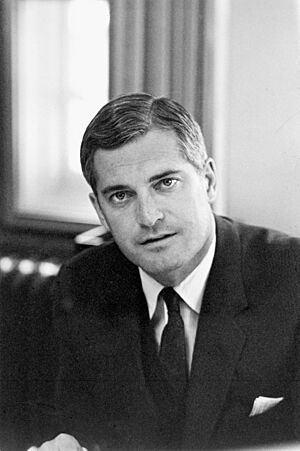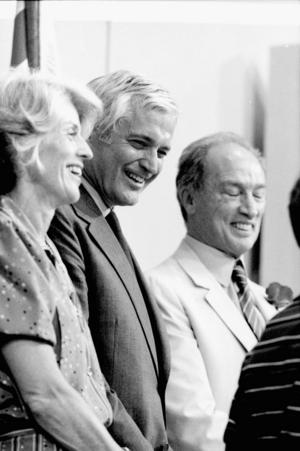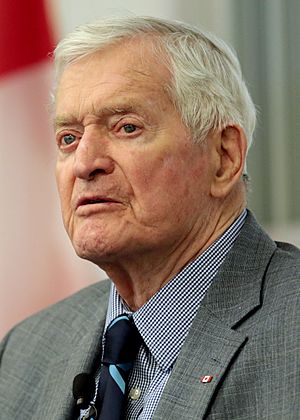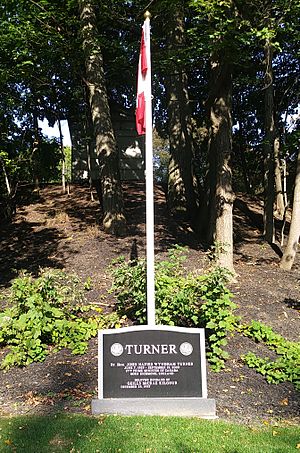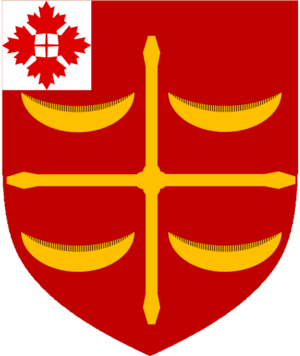John Turner facts for kids
Quick facts for kids
John Turner
|
|||||||||||||||||||||
|---|---|---|---|---|---|---|---|---|---|---|---|---|---|---|---|---|---|---|---|---|---|
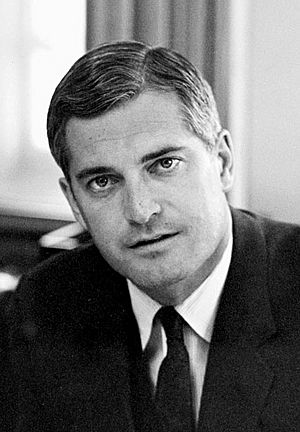
Turner in 1968
|
|||||||||||||||||||||
| 17th Prime Minister of Canada | |||||||||||||||||||||
| In office June 30, 1984 – September 17, 1984 |
|||||||||||||||||||||
| Monarch | Elizabeth II | ||||||||||||||||||||
| Governor General | Jeanne Sauvé | ||||||||||||||||||||
| Deputy | Jean Chrétien | ||||||||||||||||||||
| Preceded by | Pierre Trudeau | ||||||||||||||||||||
| Succeeded by | Brian Mulroney | ||||||||||||||||||||
| Leader of the Opposition | |||||||||||||||||||||
| In office September 17, 1984 – February 7, 1990 |
|||||||||||||||||||||
| Preceded by | Brian Mulroney | ||||||||||||||||||||
| Succeeded by | Herb Gray | ||||||||||||||||||||
| Leader of the Liberal Party | |||||||||||||||||||||
| In office June 16, 1984 – June 23, 1990 |
|||||||||||||||||||||
| Preceded by | Pierre Trudeau | ||||||||||||||||||||
| Succeeded by | Jean Chrétien | ||||||||||||||||||||
| Minister of Finance | |||||||||||||||||||||
| In office January 28, 1972 – September 10, 1975 |
|||||||||||||||||||||
| Prime Minister | Pierre Trudeau | ||||||||||||||||||||
| Preceded by | Edgar Benson | ||||||||||||||||||||
| Succeeded by | Donald Stovel Macdonald | ||||||||||||||||||||
| Minister of Justice and Attorney General of Canada | |||||||||||||||||||||
| In office July 6, 1968 – January 28, 1972 |
|||||||||||||||||||||
| Prime Minister | Pierre Trudeau | ||||||||||||||||||||
| Preceded by | Pierre Trudeau | ||||||||||||||||||||
| Succeeded by | Otto Lang | ||||||||||||||||||||
| Solicitor General of Canada | |||||||||||||||||||||
| In office April 20, 1968 – July 5, 1968 |
|||||||||||||||||||||
| Prime Minister | Pierre Trudeau | ||||||||||||||||||||
| Preceded by | Lawrence Pennell | ||||||||||||||||||||
| Succeeded by | George McIlraith | ||||||||||||||||||||
|
|||||||||||||||||||||
| In office December 21, 1967 – July 5, 1968 |
|||||||||||||||||||||
| Prime Minister |
|
||||||||||||||||||||
| Preceded by | Guy Favreau | ||||||||||||||||||||
| Succeeded by | George McIlraith | ||||||||||||||||||||
|
|||||||||||||||||||||
| Personal details | |||||||||||||||||||||
| Born |
John Napier Wyndham Turner
June 7, 1929 Richmond, Surrey, England |
||||||||||||||||||||
| Died | September 19, 2020 (aged 91) Toronto, Ontario, Canada |
||||||||||||||||||||
| Resting place | Mount Pleasant Cemetery, Toronto | ||||||||||||||||||||
| Citizenship |
|
||||||||||||||||||||
| Political party | Liberal | ||||||||||||||||||||
| Spouse | |||||||||||||||||||||
| Children | 4 | ||||||||||||||||||||
| Parent |
|
||||||||||||||||||||
| Alma mater |
|
||||||||||||||||||||
| Occupation |
|
||||||||||||||||||||
| Signature |  |
||||||||||||||||||||
John Napier Wyndham Turner (June 7, 1929 – September 19, 2020) was a Canadian lawyer and politician. He served as the 17th Prime Minister of Canada for a short time in 1984. He was also the leader of the Liberal Party of Canada and the Leader of the Official Opposition from 1984 to 1990.
Before becoming prime minister, Turner worked as a lawyer. He was elected as a Member of Parliament in 1962. He held important roles in Prime Minister Pierre Trudeau's government. These roles included Minister of Justice (1968–1972) and Minister of Finance (1972–1975). He left politics in 1975.
Turner returned to politics in 1984 and became leader of the Liberal Party. He served as prime minister for only 79 days. He then lost the 1984 election to Brian Mulroney's Progressive Conservatives. This was a big defeat for the Liberals. Turner remained the Liberal leader and led the opposition for six years. He strongly opposed a free trade agreement with the United States in the 1988 election. He stepped down as party leader in 1990.
Turner was the first Canadian prime minister born in the United Kingdom since 1896. He was also Canada's second shortest-serving prime minister. He lived to be 91, making him Canada's fourth longest-lived prime minister.
| Top - 0-9 A B C D E F G H I J K L M N O P Q R S T U V W X Y Z |
Early Life and Education
John Turner was born on June 7, 1929, in Richmond, England. His father was an English journalist, and his mother, Phyllis Gregory, was a Canadian economist. John had a brother, Michael, and a sister, Brenda. After his father died in 1932, John, his sister, and their mother moved to Canada. They first lived in Rossland, British Columbia, and then moved to Ottawa.
His mother remarried in 1945 to Frank Mackenzie Ross. He later became the Lieutenant Governor of British Columbia. The family then moved to Vancouver.
School and Sports
Turner went to Ashbury College and St Patrick's College in Ottawa. In 1945, at age 16, he started at the University of British Columbia (UBC). He was a talented track sprinter in the late 1940s. He even held the Canadian record for the men's 100-yard dash. He qualified for the 1948 London Olympics, but a knee injury kept him from competing. He earned his BA from UBC in 1949.
Turner received a Rhodes Scholarship and went to Magdalen College, Oxford at the University of Oxford. He earned several degrees there. He was also on the track and field team at Oxford. One of his teammates was Roger Bannister, who was the first to run a mile in under four minutes. Turner also studied at the University of Paris from 1952 to 1953.
Friendship with Princess Margaret
In 1959, John Turner danced with Princess Margaret at a party. This event brought him a lot of attention in Canada. People wondered if they would become a couple. They remained friends, and Turner and his wife often met the princess later in life. They attended her private funeral in 2002.
Marriage and Family
On May 11, 1963, Turner married Geills McCrae Kilgour. She was a systems engineer for IBM. Geills was also the great-niece of John McCrae, who wrote the famous poem "In Flanders Fields". John and Geills had four children: Elizabeth, Michael, Andrew, and David.
Early Political Career
Turner started his career as a lawyer in Montreal. He was elected as a Member of Parliament for St. Lawrence—St. George in 1962. He was re-elected several times. From 1968 to 1976, he represented Ottawa—Carleton.
In 1965, while on vacation, Turner saved former prime minister John Diefenbaker from strong ocean waves. Turner, a strong swimmer, pulled Diefenbaker to safety.
Serving in Cabinet
John Turner was well-respected for his work as a cabinet minister. He served under prime ministers Lester B. Pearson and Pierre Trudeau.
Under Prime Minister Pearson
He held various roles in Prime Minister Pearson's cabinet. One important role was Minister of Consumer and Corporate Affairs. When Pearson retired, Turner ran to become the next leader of the Liberal Party in 1968. At 38, he was the youngest candidate. He finished third in the leadership race, behind Pierre Trudeau.
Under Prime Minister Trudeau
Turner served as Minister of Justice for four years in Trudeau's cabinet. He worked hard to improve the justice system. He helped create the Law Commission of Canada. He also played a key role during the October Crisis in 1970.
From 1972 to 1975, Turner was Minister of Finance. This was a challenging time for the world economy. In 1975, Turner surprisingly resigned from his position. He later said he resigned because he did not want to implement wage and price controls, which he had campaigned against.
Time Away from Politics
From 1975 to 1984, Turner took a break from politics. He worked as a corporate lawyer in Toronto. When Pierre Trudeau announced his retirement in 1984, Turner decided to return to politics.
Prime Minister (June–September 1984)
Turner won the Liberal leadership election in June 1984. He was officially sworn in as prime minister on June 30. At this time, he was not a Member of Parliament or a senator. He planned to run in the next general election in Vancouver Quadra.
Before leaving office, Pierre Trudeau made many appointments to government positions. Turner then made more appointments himself. These appointments caused a lot of public anger.
The 1984 Federal Election
On July 9, just nine days after becoming prime minister, Turner called an election for early September. He believed the Liberals were ahead in the polls. However, the polls were wrong, and public anger over the appointments was growing. Brian Mulroney and his Progressive Conservatives quickly took the lead.
During the campaign, Turner seemed a bit out of touch. He was criticized for some of his actions and words. In a televised debate, Turner attacked Mulroney over political appointments. Mulroney responded by pointing out the many appointments made by Trudeau and Turner. Mulroney famously told Turner, "You had an option, sir—to say 'no'—and you chose to say 'yes' to the old attitudes." This moment made Turner look weak.
On September 4, the Liberals lost the election in a big way. They won only 40 seats, while the Progressive Conservatives won 211. This was one of the worst defeats for the Liberals in Canadian history.
Turner stepped down as prime minister on September 17. He was prime minister for only two months and seventeen days. He was the second shortest-serving prime minister in Canada's history.
Leading the Opposition
In the 1984 election, Turner won his own seat in Vancouver Quadra. He became the Leader of the Official Opposition. The Liberal Party was at a low point.
Turner's leadership was often questioned. However, he received support from his party in 1986. The Liberals used their majority in the Senate to slow down Mulroney's laws. A group of young Liberal MPs, known as the "Rat Pack", also challenged Mulroney.
The 1988 Federal Election
When the 1988 election was called, Turner strongly campaigned against the proposed Canada–United States Free Trade Agreement. He argued that it would harm Canada's independence. His strong performance in the leaders' debate helped the Liberals gain support. He accused Mulroney of "selling Canada out."
However, the Progressive Conservatives launched ads that focused on Turner's leadership struggles. This, along with pro-free trade ads, stopped the Liberals' momentum. The Tories won another majority government and passed the free trade deal.
The Liberals more than doubled their seats to 83, remaining the Official Opposition. Despite the loss, Turner had led a significant recovery for his party.
Turner announced he would step down as party leader in May 1989. He officially resigned in June 1990. Jean Chrétien won the next leadership convention. Turner continued to serve as an MP until he retired from politics in 1993.
Life After Politics
After leaving politics, John Turner supported the idea of a United Nations Parliamentary Assembly. This group works for a more democratic international political system.
In 2017, he received the Gold Medal of the Royal Canadian Geographical Society. Turner lived in Toronto.
Death and Funeral
John Turner passed away on September 19, 2020, at the age of 91. A state funeral was held for him on October 6, 2020, in Toronto. He was buried in a private service at Mount Pleasant Cemetery, Toronto.
Honours and Awards
| Ribbon | Description | Notes |
| Companion of the Order of Canada (C.C.) |
|
|
| Centennial Anniversary of the Confederation of Canada Medal |
|
|
| Queen Elizabeth II Silver Jubilee Medal for Canada |
|
|
| 125th Anniversary of the Confederation of Canada Medal |
|
|
| Queen Elizabeth II Golden Jubilee Medal for Canada |
|
|
| Queen Elizabeth II Diamond Jubilee Medal for Canada |
|
As a former prime minister, John Turner was known as The Right Honourable for the rest of his life.
In a 1999 survey of Canadian historians, Turner was ranked 18th out of the first 20 Prime Ministers of Canada.
Turner was made a Companion of the Order of Canada on October 19, 1994.
Honorary Degrees
| Location | Date | School | Degree |
|---|---|---|---|
| October 1968 | University of New Brunswick | Doctor of Laws | |
| Spring 1968 | York University | Doctor of Laws | |
| 1980 | Mount Allison University | Doctor of Civil Law (DCL) | |
| November 24, 1994 | University of British Columbia | Doctor of Laws | |
| June 1996 | University of Toronto | Doctor of Laws | |
| 2002 | Assumption University | Doctor of Laws |
See also
 In Spanish: John Turner (político) para niños
In Spanish: John Turner (político) para niños
- List of prime ministers of Canada
 | Bessie Coleman |
 | Spann Watson |
 | Jill E. Brown |
 | Sherman W. White |


